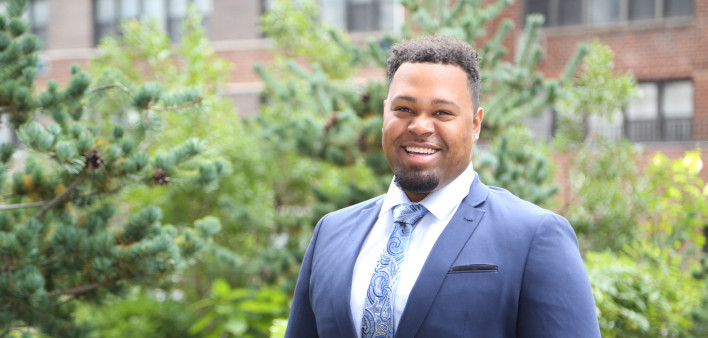Deondre Moore describes himself not just as an HIV activist, but an activist for all human rights.
Moore received his HIV diagnosis when he was a freshman in college. The hardest part was telling his mother, but she’s since become one of his biggest champions.
Moore, now 26, serves as the U.S. Partnerships and Community Engagement Manager at the Prevention Access Campaign and an ambassador for the Elizabeth Taylor AIDS Foundation.
AIDS United spoke with Moore ahead of the release of “Owning HIV Presents: HIV in Young Black America,” a collaboration between Prevention Access Campaign and Merck to raise awareness about inaccurate views on HIV among millennials.
The broader “Owning HIV” campaign was created to “inspire all of us to own the future of the HIV epidemic,” according to its website. The follow-on to the 2019 survey explores findings specifically among Black and African American young people in the United States.
According to the results of the survey:
- 33% of African American respondents living with HIV reported someone not shaking their hand due to their HIV status.
- 22% of HIV-negative African Americans were afraid of taking an HIV test because of a fear of judgment.
- 50% of African American respondents living with HIV, as well as 66% of HIV-negative respondents, were unable to define “undetectable.”
“It was somewhat disturbing to see how many millennials and Gen Z were not getting the education they needed,” Moore said. “There’s so often little or no education around this, the education that’s needed.”
Prevention Access Campaign, a member of the AIDS United Public Policy Council, works to empower people living with and vulnerable to HIV with information about their “social, sexual and reproductive health.”
The organization is behind the transformative message that undetectable = untransmittable, meaning that those of us living with HIV who are on treatment and have an undetectable viral load cannot transmit HIV through sex — or simply U=U.
Per data from the Centers for Disease Control and Prevention, more than 40% of new diagnoses are among Black and African American people in the United States — making this community the most impacted.
But messages like U=U have the power to change that.
“We saw some folks in the survey who thought that a person who was undetectable actually meant that they never were diagnosed or they had a misdiagnosis, but that’s not [what it means],” Moore said. “Correcting that and getting the right information out there is just what’s been important.”
For Moore, it’s about educating and helping other Black Americans to educate, empower and mobilize each other to increase knowledge about HIV and break through stigma around testing, treatment and prevention.
In a year where a national spotlight has been placed on the deadly impacts of anti-Blackness and white supremacy, it is more important than ever for organizations to dedicate resources for empowering Black youth.
“I’ve received so much support for the work that I’ve been doing on a social justice level,” Moore said. “I went to Minneapolis, and I was in Houston, you know, part of the protesting. I was gassed. I was shot in the chest with rubber bullets by police.”
It’s in these defining moments where we all must come together and focus on what Black and Brown communities need for their own empowerment, he adds.
“It’s because of a lack of resources provided to these communities,” Moore said. “To take what we have right here and be specific and intentional in giving this information to young people, I think it’s great and it aligns with where we are right now. … We just have to do the best that we can to ensure that our millennials and Gen Z have this information, and then in the next few years, when the next survey comes out that the results won’t look like this.”
To learn more of the survey’s findings, visit Merck’s website.








Comments
Comments